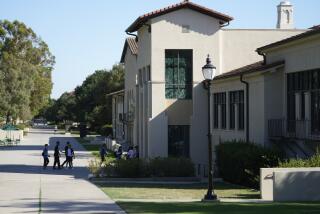Two Claremont Colleges Weigh S. Africa Divestiture
- Share via
CLAREMONT — Although administrators say that apartheid in South Africa has not been “a burning issue on campus,” trustees at both Claremont McKenna College and Pitzer College have voted to consider the withdrawal of college investments from companies that are active in South Africa.
The colleges, which are part of the six-college Claremont cluster, will ask committees composed of students, faculty and staff to review stock portfolios this fall and make recommendations to trustee investment committees on the possible divestiture of college funds.
“There is no disagreement that apartheid is a bad system,” said Jack Stark, president of Claremont McKenna College. “How we can be most effective in changing it is a subject where there is a lot of room for disagreement.”
Although the college has had a policy on socially responsible investment since the 1960s, Stark said that investment of Claremont’s $45-million free endowment has not been a visible issue on campus. He described the free endowment as the part of the endowment that the institution is at liberty to reinvest.
“Rather than sit here and hope that it never crops up, I thought it would be good to establish a process by which students and faculty can express their concerns as they surface,” Stark said.
Student concern over Pitzer’s $6-million stock portfolio has also been low key, but administrators said that it is the college’s social responsibility to take a stand on South Africa’s official policy of racial segregation.
“It is possible to define socially responsible behavior,” said Vicke Selk, treasurer and vice president for administration. “This is a wonderful opportunity to do the very thing that we’re charged with--to educate ourselves and those around us.”
Similar concerns have prompted many other colleges and universities nationwide to consider divestiture. Since 1976, at least 52 educational institutions have withdrawn more than $193 million from companies doing business in South Africa, according to Andrea Williams, spokeswoman for the American Committee on Africa in New York.
Last month, the University of California Board of Regents voted to set up a committee to conduct a case-by-case review of its stock portfolio. The university, which has a $2.4-billion investment in U.S. firms with operations in South Africa, will judge “the quality of corporate citizenship” exhibited by those businesses.
Before any decisions are made at Claremont McKenna College, Stark said he wants to set up a series of lectures and discussions on the entire issue of social responsibility and the effectiveness of divestiture.
“Do you best deal with apartheid by saying this is bad and we will have nothing to do with it?,” he asked. “I think we should bring the entire educational facilities of this institution to bear on that question.”
In fact, Stark said that the quality of the decision-making process may be more important than any statement the college ultimately makes.
“Whatever comes out, I think we are prepared to deal with it,” he said. “Of course, it’s possible we’ll make a decision I don’t like. But if we set up an equitable process, then I don’t think we’ll be ducking the issue.”
At Pitzer, Selk also expressed an interest in the educational possibilities created by the issue of divestiture:
“This has given us a chance to take a real live issue--not an academic or existential issue--and use it as an educational opportunity,” she said. “This is something that really affects us.”
However, both administrators said that the technical process of divestiture may pose problems that make the issue far more complicated.
Claremont McKenna College, for example, keeps its entire free endowment in rotating mutual funds, which make it difficult to determine exactly where the money is being invested, Stark said.
If the college were to limit beforehand the kinds of corporations it was willing to do business with, he said, “we would probably have to find another way to make money.”
More to Read
Sign up for Essential California
The most important California stories and recommendations in your inbox every morning.
You may occasionally receive promotional content from the Los Angeles Times.













